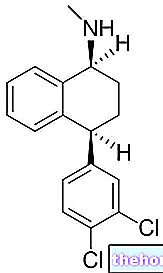
What is Zeffix?
Zeffix is a medicine that contains the active substance lamivudine. It is available as yellow capsule-shaped tablets (100 mg) and as an oral solution (5 mg / ml).
What is Zeffix used for?
Zeffix is used to treat chronic hepatitis B (a long-term liver infection caused by the hepatitis B virus) in adults. It is used in patients with:
- compensated liver disease (the liver is damaged but functioning normally), which also shows signs that the virus continues to multiply and shows signs of liver damage (increased levels of the liver enzyme alanine aminotransferase [ALT] and signs of damage when the tissue liver is examined under a microscope);
- decompensated liver disease (the liver does not function normally).
The medicine can only be obtained with a prescription.
How is Zeffix used?
Zeffix therapy should be initiated by a physician experienced in the treatment of chronic hepatitis B virus infection.
The recommended dose of Zeffix is 100 mg once a day. The medicine can be taken on a full or empty stomach. In patients with kidney problems it is necessary to reduce the dose.Doses below 100 mg should be administered with the oral solution. The duration of treatment depends on the patient's condition and response to therapy. For more information, see the Summary of Product Characteristics (also part of the EPAR).
How does Zeffix work?
The active substance in Zeffix, lamivudine, is an antiviral agent belonging to the class of 'nucleoside analogues'. Lamivudine interferes with the action of a viral enzyme, DNA polymerase, which is involved in the formation of the virus' DNA. Lamivudine stops the virus from making DNA, thus preventing it from multiplying and spreading.
How has Zeffix been studied?
Zeffix has been studied in five main studies involving a total of 1,083 adults with compensated liver disease due to chronic hepatitis B. In three studies, Zeffix was compared with placebo (a dummy treatment), in one of which in particular the "" HBeAg negative "patients. These are patients with mutated hepatitis B virus, which causes a form of chronic hepatitis B that is more difficult to treat. In the other two studies, Zeffix taken alone was compared with alpha-interferon (another treatment used for hepatitis B chronic) taken alone and with the combination of Zeffix and alpha-interferon. In a further analysis, patients were compared with and without the "YMDD mutation" (a change in the DNA of the hepatitis B virus often found after lamivudine treatment).
Information was also presented on the use of Zeffix in patients with decompensated liver disease.
There were several measures of efficacy in the studies. These included observing how liver damage developed after one year of treatment using a liver biopsy (removal of a small sample of liver tissue for examination under a microscope), as well as measuring other signs of disease such as levels of ALT or hepatitis B virus DNA circulating in the blood.
What benefit has Zeffix shown during the studies?
In patients with compensated liver disease, Zeffix was more effective than placebo in slowing the progression of liver disease. About half of the patients who took Zeffix had an improvement in liver damage found on the biopsy, compared to about a quarter of the patients who took the placebo. Zeffix was as effective as alpha interferon. In the further analysis it was noted that patients with the YMDD mutation did not respond as well to treatment with Zeffix as those without the mutation.
In patients with decompensated liver disease, Zeffix also reduced the DNA levels of the hepatitis B virus and ALT.
What is the risk associated with Zeffix?
The most common side effect with Zeffix (seen in more than 1 in 10 patients) is increased ALT levels. For the full list of side effects reported with Zeffix, see the package leaflet.
Zeffix must not be used in people who may be hypersensitive (allergic) to lamivudine or any of the other ingredients.
Why has Zeffix been approved?
The Committee for Medicinal Products for Human Use (CHMP) considered that the benefits of Zeffix are greater than its risks in the treatment of chronic hepatitis B in adults with compensated liver disease with evidence of active viral replication, consistently elevated ALT levels and histological evidence of active hepatic inflammation and / or fibrosis, and in adults with decompensated liver disease. The Committee recommended the granting of a marketing authorization for Zeffix.
Zeffix was initially authorized under "exceptional circumstances", because at the time the authorization was granted, for scientific reasons, only limited information was available. As the company provided the additional information requested, the condition referring to "exceptional circumstances" was removed on May 18, 2001.
Other information about Zeffix:
On 29 July 1999 the European Commission granted Glaxo Group Ltd a "Marketing Authorization" for Zeffix, valid throughout the European Union. This authorization was renewed on 29 July 2004 and 29 July 2009.
For the full version of the Zeffix EPAR, click here.
Last update of this summary: 07-2009.
The information on Zeffix - lamivudine published on this page may be out of date or incomplete. For a correct use of this information, see the Disclaimer and useful information page.




























